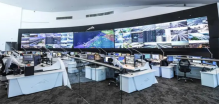The new 'track-less trains' are compliant with environment regulations and are non-polluting, and the new trains were officially announced in Zhuzhou which is located in China's Hunan province. It was disclosed at the media briefing which made the announcement that the Chinese rail corporation has been working on the initiative for the last four years, and began designing the innovative system back in 2013. It has been reported that the new public transportation system will be deployed in 2018.
The transit system utilizes rubber wheels on a plastic core to power and contains new technology which has been copyrighted by the Chinese rail corporation. It means that the trains can be automatically guided without the requirements of rails. The system will be first deployed in the city of Zhuzhou - in the government's latest efforts to reduce traffic in the area.
Reports emerging from China indicate that the new train is significantly cheaper to produce than that of a traditional subway system. It is believed to cost around the fifth of the price of a subway carriage. The projected cost of a typical subway system carriage is between 400 million yuan to 700 million yuan. One other telling feature of the newly designed 'track-less trains' is that its life span is estimated to be around 25 years.
At the launch it was further disclosed that the car was over 100ft in length and has a maximum passenger capacity of 307 people. It has a maximum speed of 70km/h and after only ten minutes of charging can travel up to 25km. In addition to this, chief engineer on the program, Feng Jianghua, disclosed that the train identifies the pavement and other various sensors which can emit travel information back to the train. This subsequently enables the vehicle to follow guidance from the virtual track.


















